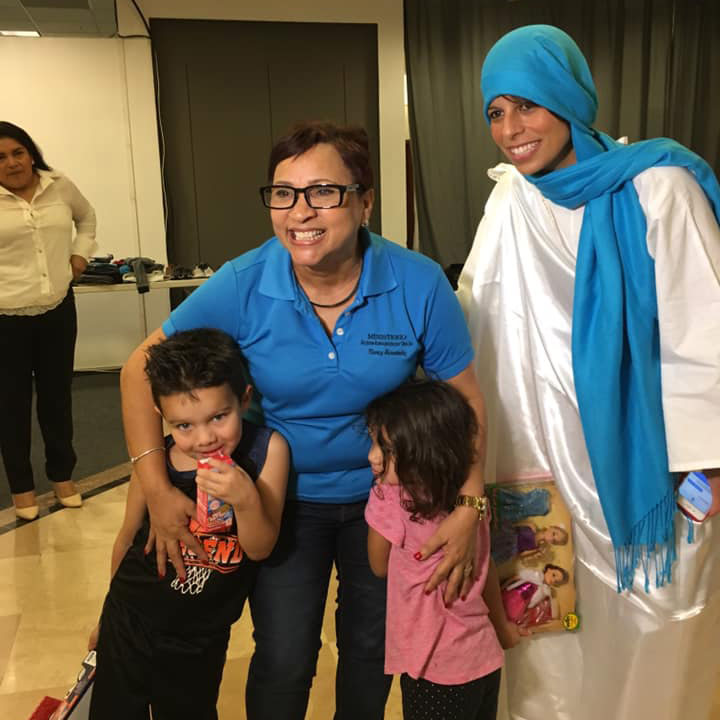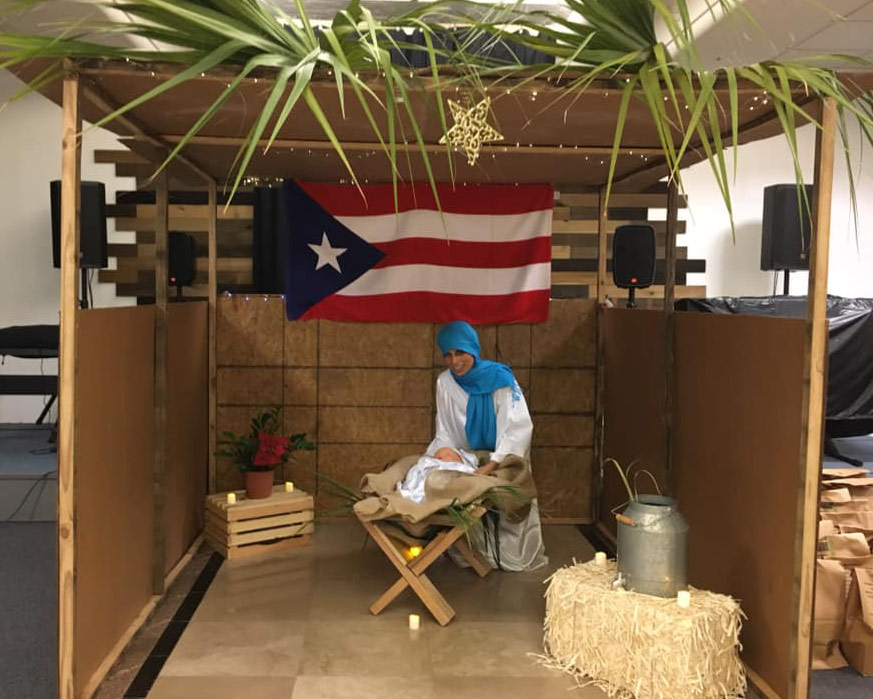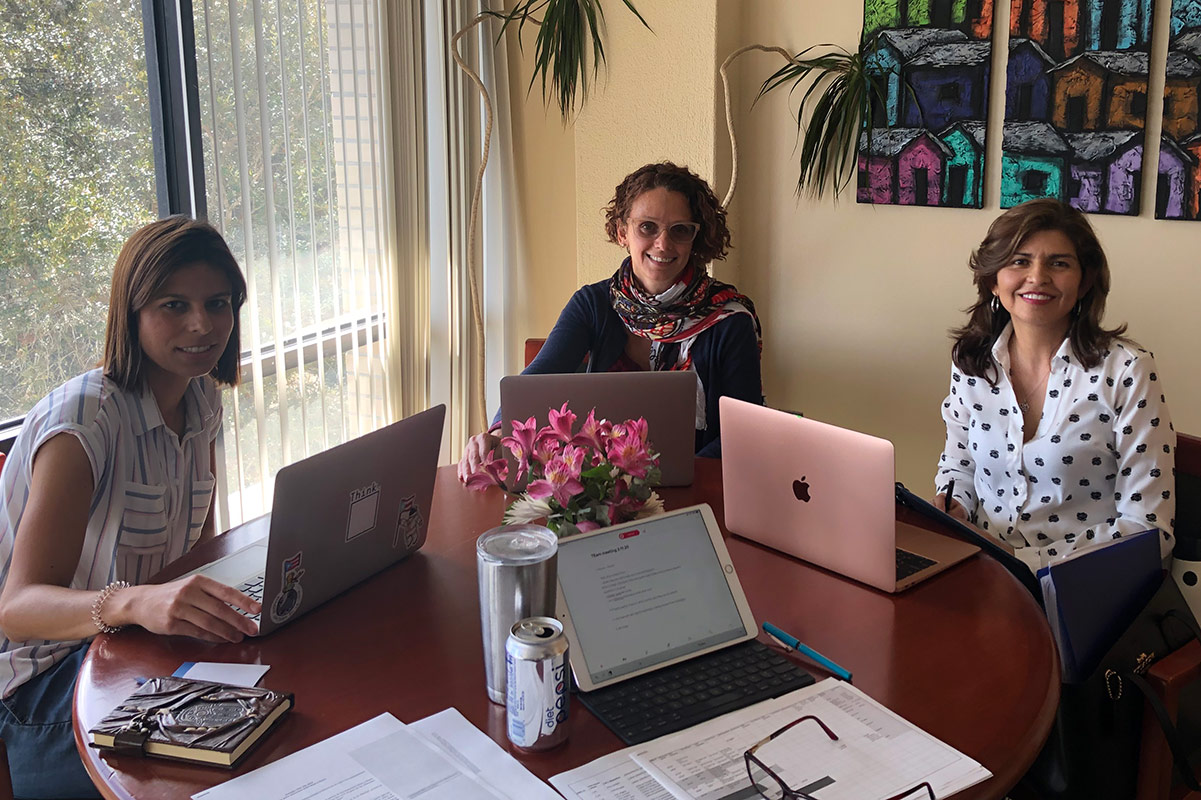Photo: Dr. Alessandra Rosa, Rebecca Blackwell, and Maritza Novoa-Hadley in our regular weekly meetings at Dr. Elizabeth Aranda's office at USF. Later, Melanie Escue joined our research team.
Since 2017, Puerto Ricans have faced numerous natural hazards and ensuing social disasters, leading many to migrate to the continental United States where they confronted the current global pandemic.

Nancy Hernandez, Dr. Alessandra Rosa, and two kids from the event pose to take a photo after opening their gifts.
In an effort to better understand these migration decisions, researchers Dr. Elizabeth Aranda and Dr. Alessandra Rosa of the University of South Florida set out in 2019 to study how post-disaster migrants from Puerto Rican fared upon relocation in Central Florida. The research team was equipped with funding from the National Science Foundation and partnered with a small non-profit organization, Mujeres Restauradas por Dios (MRD), led by Puerto Rican native Nancy Hernández.
In just one example of the stories the team heard, they detail meeting a 52-year-old post-disaster migrant named Lily, whose husband has cancer. Lily shares with the team that she and her husband were afraid of even going out for a walk.
“Our interview with Lily revealed the effects of COVID-19 on her extended family. Explaining how they were in “lockdown”, she quickly remembered how she felt in the aftermath of Hurricane Maria and stated that the COVID lockdown was like reliving it again,” explained Dr. Rosa.
“In Puerto Rico, my nephew's wife died from COVID, and my nephew has COVID, his daughter, her children too… And they are locked up there… [Moments after, she says crying that it is hard to talk about the hurricane]. You relive those moments, and it feels like it was happening right now…. And it's been three years now… Now with this pandemic, the jobs are very limited. It is not easy, one begins to think, after Hurricane Maria, everything has been a total change.” - Lily
As part of the partnership, the research team also included organization volunteer Maritza Novoa-Hadley and USF graduate students Rebecca Blackwell and Melanie Escue. Initially, the team’s goal was to collect the stories of Puerto Rican migrants helped by MRD, and in return, they would provide the organization a needs assessment that detailed what the remaining challenges were for clients as they settled into their new homes.
“The first phase of our work involved contacting slightly more than 1,000 clients to administer a phone survey that asked about their pre-hurricane circumstances, their migration stateside, and a host of post-migration outcomes that measured socio-economic integration, emotional well-being, how they were assisted by MRD, and what remaining needs they had. Phase two of our project followed up on these survey questions with in-depth interviews to learn more about the context surrounding these outcomes,” said Dr. Aranda.
However, the onset and spread of COVID-19 affected the research in more ways than were expected. In March 2020, when Florida’s stay-at-home order took effect in response to the global pandemic, the urgency and uncertainty led the team to stop the surveys and in-person interviewing.
“At the time, we felt that it would be insensitive for us to call people who may be experiencing new traumas - such as migrants like Lily - to ask them questions that would bring back memories of past traumas. We used the pause to integrate questions into our research instruments about the pandemic, and how it related to challenges in their efforts to adapt to and integrate into their new communities. We also gathered resources, through our contacts in MRD, to provide to survey respondents when we resumed data collection,” continued Dr. Aranda.
When the team resumed the phone surveys in late April, what they found was a greater willingness of this population to talk and share their stories, in addition to the revelation that there was great need among those with whom they spoke.
What was already an extensive survey— roughly 45 minutes—often turned into a 90-minute phone conversation in which the research team listened to the stories of trauma from the hurricanes and how those they spoke to were reliving it with the pandemic.

Dr. Alessandra Rosa volunteered to dress up as the Virgin Mary and pose with "baby Jesus" inside the manger, as the Three Kings followed the Bethlehem star to visit him.
“Our team provided comfort over the phone during a time of isolation, and importantly, provided connections to much-needed services such as information about available jobs, the location of food pantries, information about financial aid to help with rent and utility bills, and even resources to help victims of domestic violence.
The partnership we created with MRD was crucial for us to be able to connect our participants to the services they needed as MRD did not have the capacity to reach out to its clients at that time. Our project reinforces the value of conducting community engaged research and building local partnerships with organizations directly serving the most vulnerable populations. Having delivered the needs assessment to MRD, we are now in a role to support their continued efforts to provide direct services to not just Puerto Ricans but Latinos/as in Tampa and are planning, with them, to visit local and state representatives to present our findings about the continued needs in the Puerto Rican community,” concluded Dr. Rosa.
The research team hopes that the results of the survey will help policymakers see the need for increased investment in direct support services that local NGO’s, such as MRD, provide for the community. For more information about the study and the report, please visit www.puertoricanmigration.com.
